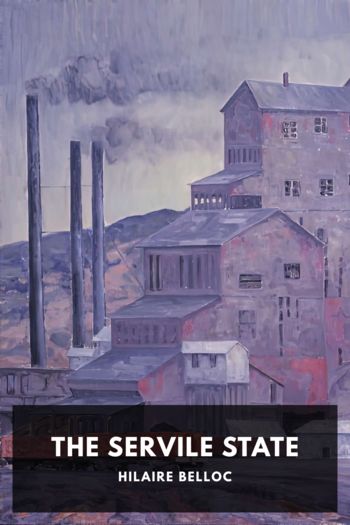The Servile State, Hilaire Belloc [ebook pdf reader for pc TXT] 📗

- Author: Hilaire Belloc
Book online «The Servile State, Hilaire Belloc [ebook pdf reader for pc TXT] 📗». Author Hilaire Belloc
Meanwhile, side by side with this emancipation of mankind in the direct line of descent from the old chattel slaves of the Roman villa went, in the Middle Ages, a crowd of institutions which all similarly made for a distribution of property, and for the destruction of even the fossil remnants of a then forgotten servile state. Thus industry of every kind in the towns, in transport, in crafts, and in commerce, was organised in the form of guilds. And a guild was a society partly cooperative, but in the main composed of private owners of capital whose corporation was self-governing, and was designed to check competition between its members: to prevent the growth of one at the expense of the other. Above all, most jealously did the guild safeguard the division of property, so that there should be formed within its ranks no proletariat upon the one side, and no monopolising capitalist upon the other.
There was a period of apprenticeship at a man’s entry into a guild, during which he worked for a master; but in time he became a master in his turn. The existence of such corporations as the normal units of industrial production, of commercial effort, and of the means of transport, is proof enough of what the social spirit was which had also enfranchised the labourer upon the land. And while such institutions flourished side by side with the no longer servile village communities, freehold or absolute possession of the soil, as distinguished from the tenure of the serf under the lord, also increased.
These three forms under which labour was exercised—the serf, secure in his position, and burdened only with regular dues, which were but a fraction of his produce; the freeholder, a man independent save for money dues, which were more of a tax than a rent; the guild, in which well-divided capital worked cooperatively for craft production, for transport and for commerce—all three between them were making for a society which should be based upon the principle of property. All, or most—the normal family—should own. And on ownership the freedom of the state should repose.
The state, as the minds of men envisaged it at the close of this process, was an agglomeration of families of varying wealth, but by far the greater number owners of the means of production. It was an agglomeration in which the stability of this “distributive” system (as I have called it) was guaranteed by the existence of cooperative bodies, binding men of the same craft or of the same village together; guaranteeing the small proprietor against loss of his economic independence, while at the same time it guaranteed society against the growth of a proletariat. If liberty of purchase and of sale, of mortgage and of inheritance was restricted, it was restricted with the social object of preventing the growth of an economic oligarchy which could exploit the rest of the community. The restraints upon liberty were restraints designed for the preservation of liberty; and every action of medieval society, from the flower of the Middle Ages to the approach of their catastrophe, was directed towards the establishment of a state in which men should be economically free through the possession of capital and of land.
Save here and there in legal formulae, or in rare patches isolated and eccentric, the servile institution had totally disappeared; nor must it be imagined that anything in the nature of collectivism had replaced it. There was common land, but it was common land jealously guarded by men who were also personal proprietors of other land. Common property in the village was but one of the forms of property, and was used rather as the flywheel to preserve the regularity of the cooperative machine than as a type of holding in any way peculiarly sacred. The guilds had property in common, but that property was the property necessary to their cooperative life, their halls, their funds for relief, their religious endowments. As for the instruments of their trades, those instruments were owned by the individual members, not by the guild, save where they were of so expensive a kind as to necessitate a corporate control.
Such was the transformation which had come over European society in the course of ten Christian centuries. Slavery had gone, and in its place had come that establishment of free possession which seemed so normal to men, and so consonant to a happy human life. No particular name was then found for it. Today, and now that it has disappeared, we must construct an awkward one, and say that the Middle Ages had instinctively conceived and brought into existence the distributive state.
That excellent consummation of human society passed, as we know, and was in certain provinces of Europe, but more particularly in Britain, destroyed.
For a society in which the determinant mass of families were owners of capital and of land; for one in which production was regulated by self-governing corporations of small owners; and for one in which the misery and insecurity of a proletariat was unknown, there came





Comments (0)